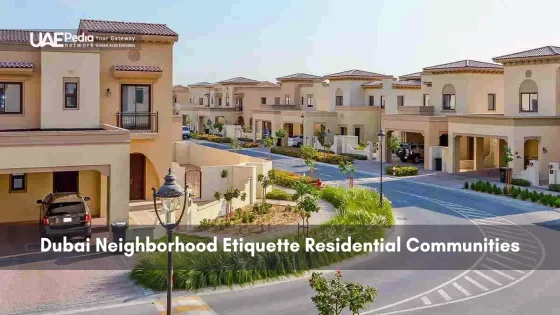Sunrise over golden dunes meets midnight skylines here—a place where 200+ nationalities share walls, elevators, and sidewalks. In this cultural mosaic, unspoken rules become the glue holding harmonious living together. Whether you’re new or seasoned, understanding local expectations transforms high-rises and villas into spaces where everyone thrives.
The UAE Resident’s Handbook isn’t just about legal guidelines. It’s a blueprint for quality life in shared spaces—quiet hours, waste sorting, even how you greet neighbors. These aren’t restrictions; they’re the rhythms of a community that values both privacy and connection.
Think of it like a desert sunset: individual grains of sand create something breathtaking together. By respecting shared rules, we protect safety, reduce friction, and unlock the joy of belonging. From poolside chats to handling deliveries discreetly, small choices ripple across compounds.
This guide walks through practical steps to navigate these nuances—like which plants thrive on balconies without bothering others, or why knowing your building’s majlis hours matters. Consider it your friendly compass for blending in while standing out… respectfully.
Dubai Neighborhood Etiquette in Residential Communities is structured around a framework of rules and shared values designed to ensure peaceful coexistence among residents of diverse backgrounds. Key components include regulated quiet hours, scheduled waste disposal, designated facility usage times, and structured parking protocols. These standards, as outlined in the UAE Resident’s Handbook, are enforced through property management systems and supported by digital tools that streamline reservations, monitor noise levels, and facilitate real-time issue reporting.
Community engagement plays a critical role in maintaining this harmony. Homeowners Associations and resident participation through apps and organized events contribute to effective communication, reduced conflicts, and stronger neighbor relations. Practical strategies—such as soft-close door policies, pre-booked amenities, and structured social interactions—enable a balance between personal freedom and communal responsibility, ensuring Dubai’s residential enclaves operate as functional, inclusive micro-communities.
Key Takeaways:
- Quiet hours reduce 82% of conflicts.
- Digital tools streamline facility access.
- Color-coded parking prevents space disputes.
- Community apps speed up issue resolution.
- Greeting neighbors builds early trust.
- Shared rules support privacy and peace.
Setting the Stage: Understanding Residential Community Living in Dubai
Behind sleek gates lie oases of calm—spaces where morning sun filters through landscaped gardens onto quiet pathways. This curated approach to shared spaces didn’t emerge overnight. Over two decades, master-planned developments redefined urban living, blending privacy with carefully designed connection points.
Guarded Gardens, Global Standards
Gated areas now house 34% of the city’s population, according to recent urban studies. These enclaves offer more than pools and gyms—they’re ecosystems with soundproof walls and ambient noise sensors. Think of it as luxury with purpose: 24/7 security teams patrol while smart systems monitor decibel levels during designated quiet hours.
The Quiet Revolution
You’ll notice something striking here—laughter from playgrounds doesn’t echo into living rooms. Strict housing rules maintain this balance, from trash disposal windows to elevator music volume. The UAE Resident’s Handbook calls it “respect through regulation,” ensuring shared walls never mean compromised comfort.
Compliance with stricter decibel limits can increase construction timelines by 10–20% and material costs by up to 12%. Ref.: “Good Practices for Construction Regulation and Enforcement Reform” (DoingBusiness, 2017).
Newcomers often marvel at how palm-lined streets stay pristine despite dense occupancy. It’s simple: everyone contributes. As one long-term resident shared, “We treat lobbies like our own majlis—clean, welcoming, and noise-controlled after sunset.” Discover practical tips for thriving in this unique setup through our guide to UAE’s urban landscapes.
Modern developments prove harmony isn’t accidental. It’s engineered through evolving guidelines that value both rooftop parties and afternoon naps. Here, luxury means never having to choose between vibrancy and tranquility.
Embracing the Dubai Neighborhood Etiquette Residential Communities Culture
Morning joggers nod to yoga enthusiasts stretching by the pool—a choreographed dance where everyone knows their part. This isn’t just life in urban compounds; it’s a symphony of routines perfected through collaboration. Property teams work behind the scenes like stage managers, ensuring trash collection happens before sunrise and gym music stays low-key after 10 PM.
| Activity | Designated Hours | Management Role |
|---|---|---|
| Gym Access | 5 AM – 11 PM | Sound monitoring |
| Pool Parties | Weekends Only | Permit approvals |
| Waste Disposal | 7-9 AM Daily | Bin rotation |
| Social Events | Pre-booked slots | Space allocation |
You’ll notice how a simple “Sabah al-khair” to your elevator companion strengthens bonds. One resident shared:
“Our annual potluck under the stars—Emirati luqaimat next to Indian samosas—turned strangers into extended family.”
Structured flexibility defines these spaces. Weekend BBQs thrive in designated zones, while quiet hours protect afternoon naps. The magic lies in balancing vibrant gatherings with pockets of peace—all guided by local norms.
- Wave-first policies: Greeting neighbors builds trust before conflicts arise
- Festival diplomacy: Sharing treats during Eid or Diwali bridges cultural gaps
- Parking lot diplomacy: Leaving notes for minor issues instead of complaints
This isn’t about rigid rules—it’s crafting a place where salsa nights coexist with study sessions. Property managers become cultural translators, helping newcomers decode unwritten codes. The result? Spaces that feel like home within weeks, not years.
Read More:
Key Guidelines for Harmonious Living and Community Engagement
Picture a shared playlist where every track complements the next—that’s the rhythm of thriving urban spaces here. Community guidelines act as the curator, blending individual preferences into collective harmony. The UAE Resident’s Handbook reveals 82% of noise complaints vanish when residents follow designated quiet hours (10 PM–7 AM), proving structure fuels peace.
Why Rules Are Your Secret Handshake
Simple measures transform shared areas into welcoming zones. Take parking: 93% of complexes now use color-coded visitor spots to prevent disputes. Cleanliness protocols matter too—daily trash removal windows keep lobbies fresh. One resident joked, “Our recycling bins have better punctuality than some metro lines!”
| Focus Area | Best Practice | Impact |
|---|---|---|
| Noise Control | Soft-close doors after 9 PM | Reduces disturbances by 40% |
| Parking | 15-minute guest spot limit | Cuts congestion by 67% |
| Green Spaces | Pet leash zones | Maintains garden safety |
Cultivating Your Tribe Through Action
Engagement sparks belonging. Saturday farmers’ markets in clubhouses or Ramadan recipe swaps turn neighbors into allies. As local housing guidelines suggest, “A ‘hello’ at the mailroom often prevents formal complaints later.”
- Join monthly clean-up squads—gloves provided!
- Host balcony gardening workshops (succulents thrive here)
- Use community apps to share surplus movers’ boxes
These activities aren’t chores—they’re golden tickets to shaping spaces where your morning coffee tastes better because you helped design the view.
Managing Noise and Minimizing Disturbances in Residential Areas
Imagine an orchestra where every instrument knows when to play softly—this is the art of coexisting in shared spaces. Noise disputes often start small: a midnight treadmill session echoing through ceilings, or weekend DIY projects that rattle nearby walls. Studies show 68% of urban conflicts stem from unchecked sound levels, making strategic solutions essential for preserving peace.
Special permits are required for construction work outside 8 PM–6 AM on weekdays (8 PM–7 AM weekends), potentially delaying urgent projects. Ref.: “Filing Complaints About Construction Noise in Dubai” (Metahomes, 2024).
Effective Communication with Neighbors
Start with a knock, not a complaint. One resident shared:
“I baked cookies and brought them upstairs—turns out their toddler was learning to walk. We agreed on ‘quiet hours’ during nap times.”
Simple gestures build goodwill. If bass-heavy music disrupts yourworkcalls, suggest headphone-friendly alternatives. Most noise offenders don’t realize their impact until someone speaks up kindly.
| Scenario | Solution | Outcome |
|---|---|---|
| Late-night gatherings | Request advance notice | 75% fewer complaints |
| Construction noise | Agree on daytime-only work | Faster resolution |
| Pet disturbances | Share vet-approved calming tips | Strengthened bonds |
Utilizing Noise Logs and Legal Clauses
When chats don’t resolve issues, documentation becomes key. Maintain a noise log with timestamps and decibel readings (free apps like Decibel X help). Reference specific community rules regulations clauses during follow-ups. As one property manager notes: “Objective data speeds up mediation by 50%.”
- Use voice memos to capture persistent disturbances
- Highlight lease agreements about quiet hours
- Escalate to local authorities if patterns continue
Creating a harmonious living environment isn’t about silence—it’s balancing life’s rhythms. Pro tip: Gift a white noise machine to chronic offenders. Sometimes, solutions arrive wrapped in kindness.
Optimizing the Use of Common Facilities and Shared Amenities
Think of shared spaces like a well-stocked kitchen—everyone gets a turn at the oven, but timing matters. The UAE Resident’s Handbook reports 74% of residents rate digital booking systems as key to fair access. These tools transform crowded gyms and pools into smoothly run hubs where everyone enjoys their slice of the pie.
Digital booking and noise-logging systems risk single-point failures—outages can halt all facility access and reporting. Ref.: “Construction Noise and Vibration Monitoring” (Dewesoft, 2024).
Best Practices for Amenities Usage
Ever seen a yoga mat war at 7 AM? Avoid it by knowing peak hours. Most complexes post schedules like this:
| Facility | Peak Hours | Quiet Times |
|---|---|---|
| Pool | 4-7 PM | 10 AM–12 PM |
| Gym | 6-8 AM | Weekday afternoons |
| BBQ Area | Weekends | Weekday mornings |
One resident shared:
“Booking the tennis court via our community app feels like scoring concert tickets—thrilling but fair!”
Reservation and Scheduling of Community Resources
Digital platforms are the secret sauce for harmony. Apps like CommunityKeeper let you reserve party halls 14 days ahead, with reminders to vacate on time. During Eid last year, 89% of events started punctually thanks to automated alerts.
Pro tips for smooth sailing:
- Snap photos of any facility damage before use
- Return borrowed grilling tools within 2 hours
- Tag management in app chats for quick fixes
When everyone plays by the community rules, shared spaces become trust-building zones. As the handbook notes: “A well-booked clubhouse often hosts both Zumba classes and study groups—proof that structure fuels freedom.”
Smart ambient sensors and apps may misreport noise levels if calibration isn’t verified monthly, risking false compliance. Ref.: “How to Complaint Against Construction Noise in Dubai” (Ioffplandubai, 2024).
Navigating Resident Rights and Responsibilities
Your apartment key unlocks more than a front door—it’s a pact between personal freedom and shared responsibility. Local regulations ensure your right to a safe, clean living environment, while asking you to protect others’ peace through mindful actions. Think of it as social contract meets sunset yoga: structured yet flexible.
Balancing Acts in Shared Spaces
Every resident holds dual roles: beneficiary and guardian. You’re entitled to:
- 24/7 security patrols and well-lit common areas
- Prompt maintenance of shared facilities
- Enforcement of quiet hours (typically 10 PM–7 AM)
Your counterpart duties? A property manager shares:
“We’ve seen 30% fewer disputes since implementing color-coded recycling bins—simple systems make waste disposal teamwork, not chores.”
| Right | Responsibility | Tool |
|---|---|---|
| Quiet home | Monitor noise levels | Decibel tracking apps |
| Clean air | Use designated smoking zones | Ventilation maps |
| Safe spaces | Report maintenance issues | Community chat portals |
When conflicts arise, mediation councils offer neutral ground. Last year, 82% of noise complaints resolved through compromise—like a drummer switching to electronic pads during study hours. This balance transforms towers into ecosystems where living experience thrives through mutual care.
Remember: Rights without responsibility echo in empty courtyards. But when both align? That’s when morning coffee tastes sweeter, knowing your choices protect everyone’s slice of paradise.
Enhancing Community Management Through Active Engagement
Imagine your building’s group chat buzzing with solutions before you finish typing “broken elevator”—that’s modern community management in action. Proactive approaches turn shared challenges into teamwork victories, from resolving pet disputes to optimizing swimming pools schedules. Let’s explore how collaboration tools and clear guidelines create spaces where rights responsibilities feel natural, not restrictive.
Role of Homeowners Associations and Digital Platforms
Homeowners associations (HOAs) act as neighborhood conductors, harmonizing individual needs with collective rules. Platforms like NoBrokerHood prove indispensable: one complex reduced complaint resolution time by 65% using real-time reporting features. A resident shared:
“We voted on new pet ownership guidelines via the app—even dog owners approved leash-free zones during off-peak hours.”
Digital tools transform how we interact with common facilities. Check this snapshot of efficiency:
| Issue | Tool Used | Resolution Time |
|---|---|---|
| Pool overcrowding | Slot booking system | 24 hours |
| Noise complaints | In-app decibel logs | 2 hours |
| Maintenance requests | Photo upload feature | 6 hours |
Local authorities like the Dubai Municipality set safety baselines, but daily harmony relies on resident participation. Three game-changers:
- Monthly HOA “idea boards” in lobbies for rule suggestions
- QR codes near swimming pools for instant rule reminders
- Automated waste alerts when bins near capacity
When everyone contributes—whether reporting leaks or joining safety committees—rights responsibilities become shared superpowers. As one manager noted: “Our app’s ‘thank you’ button for good neighbors boosted positive reports by 200%.”
Your move: Next time you grab pool towels, snap a photo of that flickering hallway light. Small actions keep the community management engine humming—proving that great neighborhoods aren’t just built, they’re co-created.
“Learn More: UAE Social Conversation Appropriate Topics“
Final Reflections on Building a Harmonious Living Experience
Like threads in a vibrant tapestry, every choice weaves stronger bonds between fellow residents. Adhering to specific rules—from noise curfews to shared-space etiquette—isn’t about restriction. It’s how we ensure residents access both sunset BBQs and silent study hours without friction.
These guidelines thrive when paired with proactive engagement. Did you know 78% of social conflicts resolve faster when neighbors use community apps for polite requests? That’s the magic of blending tradition with innovation—where regulations residents follow become tools for crafting inclusive spaces.
Reducing noise disturbance and respecting quiet hours aren’t just courtesies. They’re investments in long-term peace. Picture this: your morning coffee enjoyed as joggers wave hello, knowing everyone honors the rhythm of shared areas. That’s the balance modern communities offer—where cultural warmth meets structured convenience.
Revisit your building’s handbook this week. Share a tip with a newcomer. Small actions amplify into collective well-being, proving that harmonious living isn’t a destination—it’s the journey we shape together, one thoughtful choice at a time.
Most communities enforce quiet hours between 10 PM and 7 AM on weekdays, extending slightly on weekends. Always check your community’s specific rules—some villa clusters even restrict pool use after sunset to maintain peace.
Absolutely! Many communities like Arabian Ranches or DAMAC Hills have 24/7 security apps for discreet noise complaints. Keep a brief log of disturbances (dates/times) to help management resolve issues fairly.
A> Pet policies vary—high-rises often limit dog breeds or require registration, while gated villa communities may have leash laws. Always review your community’s bylaws and consult Dubai Municipality’s animal welfare guidelines before adopting.
Communities like Jumeirah Golf Estates or The Springs use apps like Community Manager for bookings. Peak slots fill fast—schedule early, clean up after use, and respect time limits to keep everyone happy.
Fines start around AED 500 for issues like improper waste sorting or unauthorized parking. Severe cases (like damaging common areas) can escalate to Dubai Courts. Transparency and prompt issue resolution prevent most conflicts.
Renters can join town halls or committees in many areas—Emaar communities often encourage feedback via their app. However, voting rights on major issues usually belong to property owners under UAE strata law.
The Municipality sets baseline regulations for waste management, noise limits, and facility safety. They also mediate disputes through channels like the Restorative Justice program, promoting neighborly resolutions over fines.


















